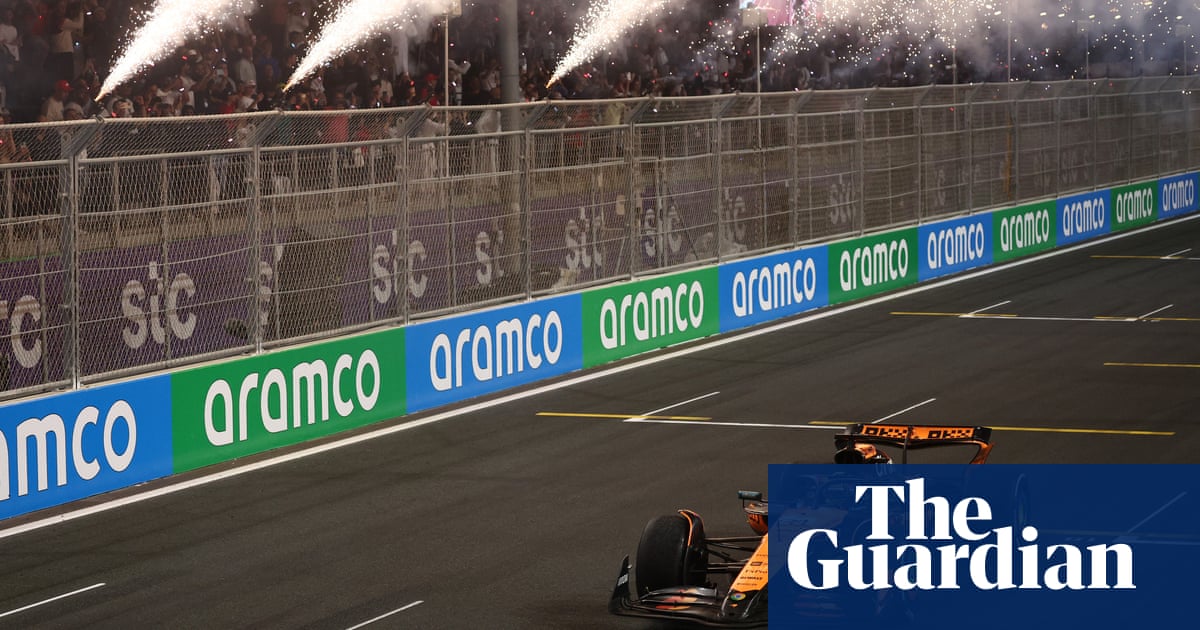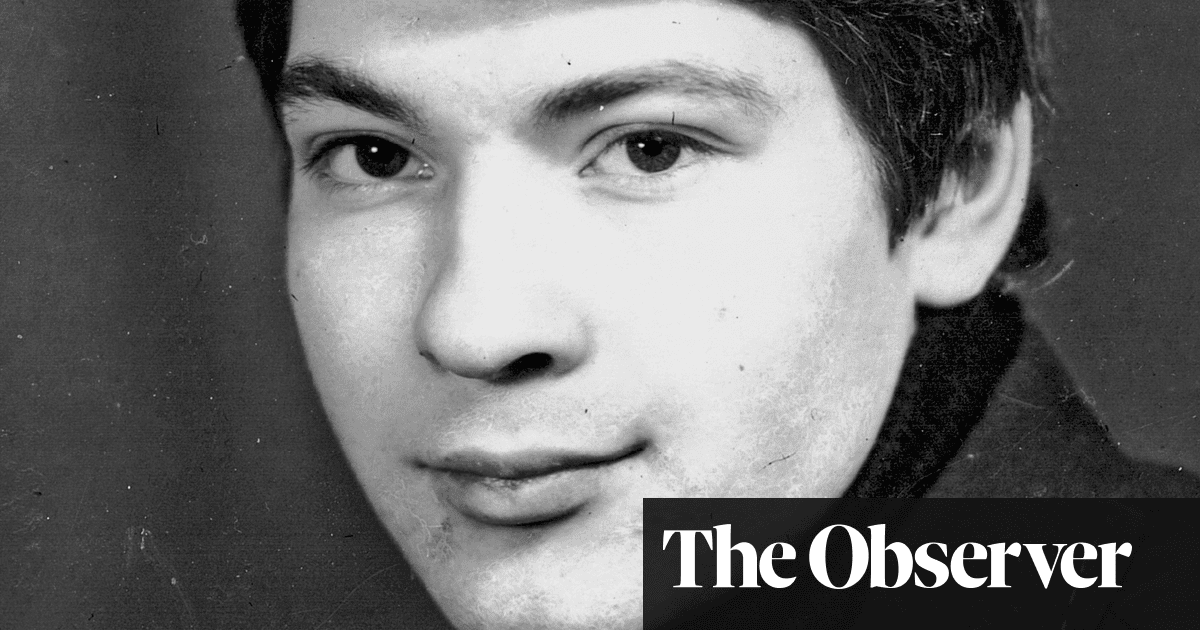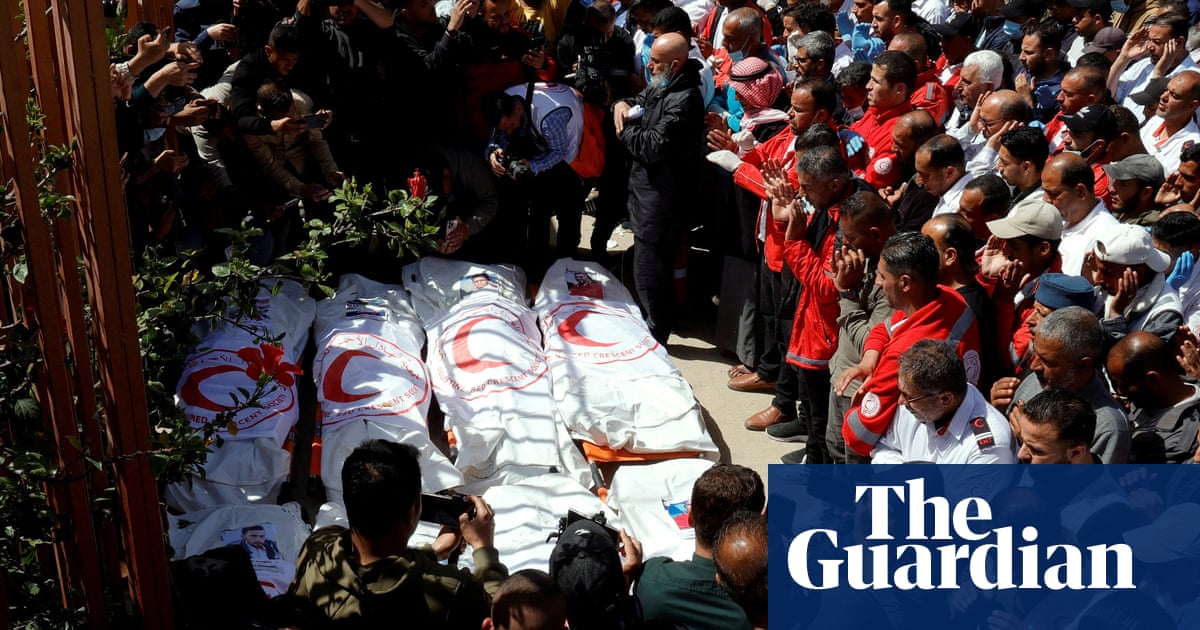The ambulance pulls up on a narrow street at the Balata Palestinian refugee camp in Nablus in the West Bank, seemingly no different from one of the many emergency vehicles that drive in the area every day. But then five armed Israeli soldiers emerge from the vehicle, going on to take part in a raid that results in the death of two civilians, including an 80-year-old woman, in an incident that Israel’s army admitted constituted “a serious offence … [and] violation of existing orders and procedures”.
The Guardian has reviewed video captured by a surveillance camera, spoken with witnesses and a survivor of the military operation, conducted by the IDF on 19 December 2024 using a hospital vehicle with Palestinian licence plates. It was described by rights groups as a “flagrant violation” of international humanitarian law, which prohibits the use of medical vehicles to carry out military attacks that result in injury or death of people.

“Israel is no longer trying to hide its war crimes and is acting as though the norms and rules of international law do not apply,’’ said the prominent Israeli rights group B’Tselem, which investigated the incident.

Security footage from a shop on Al-Suq Road shows Israeli soldiers disembarking from at least two vehicles. Five servicemen descend from an ambulance while at least five others emerge from what appears to be a civilian white van. Shots appear to be fired and pedestrians run for their lives.
An elderly woman, who was talking at the roadside with a neighbour, falls to the ground, wounded. She attempts to raise her hand in a plea for help, but it is said that within seconds, she is fatally shot with two more rounds from an assault weapon by the soldiers. Her name was Halimah Saleh Hassan Abu Leil, 80.
“I was holding a bag of bread to take home as Halimah stopped me in the street,” said Rashida Abu Al Reesh, 73, who can be seen in the clip standing next to the victim. “She was about to invite me to her house. Suddenly there was a car of men who held their rifles up. They started shooting. Poor Halimah fell down instantly, and I ran to hide anywhere until I escaped down the street.”

It remains unclear if the Israeli special forces, who emerged from the ambulance, fired one of the final shots that killed the woman. According to some witnesses, they opened fire on civilians, wounding at least six. Military sources suggest that the operation aimed to arrest or eliminate six members of the Balata local militia linked to Fatah fighters. However, the mission apparently failed, with none of the targets captured or killed. Nevertheless, two Palestinian residents, Halimah, and Ahmad Qusai ‘Issa Sarouji, 25, died in the attack.
The Israeli army admitted that “during the operation in Nablus, an ambulance-like vehicle was used for operational purposes, without authorisation and without the relevant commanders’ approval”.
“Reports were received about harm to civilians during the exchanges of fire and the circumstances of the incident are being examined,” the IDF said in the statement. “The use of the ambulance-like vehicle during the operation was a serious offence, exceeding authority, and a violation of existing orders and procedures. The use of civilian and medical means for military purposes is prohibited, and any deviation from this does not reflect the conduct of the IDF.”

As a result of the investigation, the IDF said “the commander of the ‘Duvdevan’ Unit was reprimanded by the commanding officer of the central command, while a disciplinary response was issued to the commander of the platoon by the commander of the 98th division.”
“This is a specific incident that does not reflect the nature of the unit or its many achievements over the years, and in particular during the war,” the IDF added.
According to friends and relatives of Ahmad Qusai, he was not a member of the local militia but a hairdresser. Witnesses state that he was killed by one of the Israeli snipers who had climbed to the roof of a building in the camp during the operation.
“We woke up in the morning to the sound of gunfire,” said Jamila Sarouji, 65, the mother of Ahmad Qusai, in tears. “We were still having breakfast. His aunt was shouting at him: ‘Be careful Qusai! Don’t look outside!’ And while she was still alerting him we saw his blood flowing. We tried to call the ambulance but in vain”
“He was only 25 years old, said his brother Mohammed, 35. “He did not have any connection to any resistance group, he was just a simple civilian. This was a crime. Israeli soldiers do not differentiate between civilians and armed people.”

During the raid, the Israelis severely wounded another resident, Hussein Jamal Abu Leil, 25, a nephew of Halimah. Due to his injuries, Hussein underwent a critical surgery in which a kidney and spleen were removed.
“I went down and stood at the entrance of the neighbourhood and as soon as I stopped, I felt like I got shot,” says Hussein. “I crawled and went into our neighbour’s shop. I went inside and sat down and then they started shooting from outside at the glass. I felt like I was going to die. Then the Israeli military entered the shop – one of them had a pistol. I tried to cover my head and he came closer and shot me twice in the stomach. They put me inside the Jeep with them, covered my face with a kitchen apron and tried to strangle me. Then they started beating me, and on the road, when I asked for water they forced me to open my mouth and they spit in it. Then I remember I was taken by the ambulance before I fainted and lost consciousness.”

Hussein was taken by the army to a hospital in Tel Aviv and after two days he was released and moved back to Nablus, where he spent about 16 days in a health facility.
A witness, Mohammed Himmo, 35, told the Guardian that soldiers began firing indiscriminately at passersby.
“I was working by the door of the bakery cooling the bread till this ambulance passed just behind us,” Mohammed says. “We were shocked and couldn’t realise if this was a movie scene or reality until I saw the old lady shot and Hussein shot. In a very few seconds, they started shooting at people nearby without caring about the women, the children or anyone.”
Michael Sfard, an Israeli human rights lawyer and legal adviser for B’Tselem, says that the most fundamental principle of international laws of warfare is the principle of distinction, which requires combatants at all times distinguish between civilians and combatants.

“That means, among other things, an obligation to on the part of combatants to distinguishing themselves from civilians, says Sfard. “A military force disguised as a medical crew is a violation of the principle of distinction, thus a violation of international law.’’
“In certain circumstances the use of a vehicle that looks like a civilian ambulance by combatants may amount to a war crime, like killing or wounding treacherously individuals belonging to the hostile nation or army,” he added.
Violence in the West Bank has surged in tandem with the war in Gaza. More than 14,300 Palestinians have been detained by the Israeli army in the West Bank since October 2023, according to Palestinian figures. According to the UN’s office for the coordination of humanitarian affairs (Ocha), between 7 October 2023 and 21 October 2024, 732 Palestinians have been killed in the West Bank, including East Jerusalem.

 3 months ago
45
3 months ago
45













































